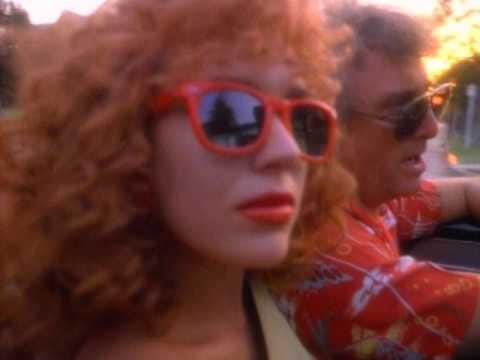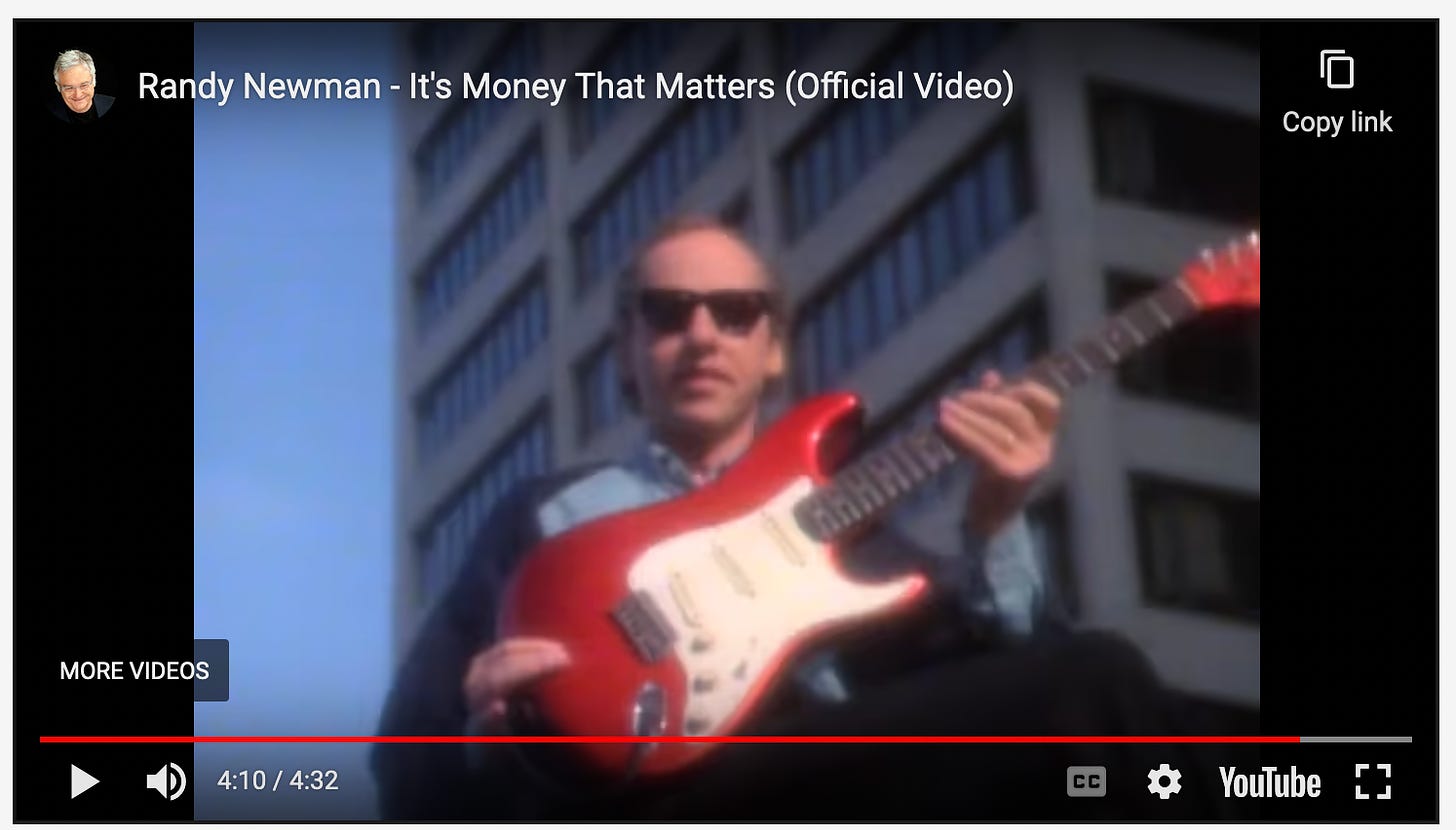Condolences to all of our friends “across the water” upon hearing the sad news of Queen Elizabeth’s passing.
Last week’s Bonus Round: “It’s Money That Matters”, Track 11 from his 1988 album "Land Of Dreams".
From Songfacts: Although Newman is a pianist by training, the dominant instrument on this number is a slightly distorted electric guitar played by Mark Knopfler, a sound which is as natural as the choir on the chorus. In many ways this four minute track is a typical Randy Newman song, and epitomizes the ambiguity that so many successful Americans feel about their country. Unquestionably personal, it relates how he looks around and sees people who are more intelligent, gifted and industrious than himself ekeing out a living. This can't be fair, he thinks. Then he hearkens back to his boyhood and an encounter with a rich man who tells him it's money that matters. This is of course a well worn cliché, but leaving that aside, Newman is a shade too hard on himself. He may not be a brain surgeon but his talents as a performer and more particularly a composer have more than earned him his share of the American dream. Credit: Songfacts - It's Money That Matters
What a delicious treat to learn after all this time (I loved this video on MTV back in the day!) that the great Mark Knopfler is the guitarist on this song!! Mark Knopfler is my favorite guitarist/songwriter ever and I’m kind of kicking myself for not recognizing his style which shines through on this track!
Ya gotta be real quick to catch it, but there’s Mr. Knopfler and an iconic Stratocaster, though we don’t know if it’s “The '61 Strat”:
Last week we talked about a very handy strumming pattern, the calypso pattern that is always a go-to pattern and very flexible. Here’s a link to a very well done primer on a variety of more or less basic strum techniques and patterns - I learned a few new things.
Some songwriting links and comments:
Some of these are going to be “what not to do” as an independent musician/performing and recording artist/songwriter - important things to keep in mind as you take some of your first steps into a pretty crowded field.
But some mistakes are actually blessings in disguise and consider the value of authentic sounding music versus “over-mastering” a song to perceived perfection. The great Jimi Hendrix once noted that he knew he had “made it” when other artists began incorporating his mistakes into their covers of his songs, not realizing as they did so that they were his “mistakes”.
I’ve talked before about how difficult this step is for me. I can read a score, and I have an understanding of stepwise melody. But since I write lyrics first (usually), a melody begins to form in my head as to how I’m going to sing the song between chord changes. As I write lyrics, I find the places where chord changes seem to “fit” - and that goes back to “phrasing” lyrics. In my December 17, 2021 post “Nuts and Bolts” I used this definition:
“Here’s a reasonably good, if somewhat pompous, definition from Oxford’s Music Dictionary: “Phrase. Short section of music of a musical composition into which the music, whether vocal or instrumental, seems naturally to fall. Sometimes this is 4 measures, but shorter and longer phrases occur. It is an inexact term: sometimes a phrase may be contained within one breath, and sometimes sub-divisions may be marked. In notation, phrase-marks are the slurs placed over or under the notes as a hint of their proper puntutation in performance. The art of phrasing by a performer is often instinctive and is one of the features by which a supreme artist may be distinguished from one of lesser inspiration, whether singer or instrumentalist.”
Link to the post: Nuts and Bolts
So chord changes sort of naturally fall at least at the beginning of a phrase, with the lyric phrase often beginning on the beat where the chord change occurs or just as often on the second beat, which sort of “introduces” the phrase harmonically. You can do either, or something else entirely, but using the chord change to highlight the phrase makes it easier for your listeners to catch what you’re trying to convey.
In that post you’ll also find a definition of “meter” (one specifically regarding poetry, but much of our songwriting is just finding a way to set our poetic lyrics to music or vice versa), which kind of boils down to syllable counts, and lines per section: verse, chorus, bridge, etc. Again, these are other people’s rules, which you are free at your peril to ignore. If you do, it kind of leads to the question of who are you writing for: Your audience, or yourself? I think the best answer to that is mostly both, though both parties, you and your audience, and perhaps other artists who cover your songs, will have subjective judgments of success, and your mileage may vary.
Here’s a link to one such disagreement between artists in a post by our friend Brad Kyle, though for the record, I’m on Declan’s side in this one.
If you’re a songwriter recording and mixing your own music, having it professionally mastered and then releasing it commercially, at some point you’re going to have to promote it, most likely through performance in a live venue of some sort. Somewhere in that process it’s probably a good idea to think about good places to add some improvisation in the live version. Better ahead of time than when you’re on stage trying to think of something, though that can have its own charm if you have capable bandmates.
Speaking of promoting your released music, here’s a good explanation of who’s going to do that (hint: it’s you):
Finally, for today, sometimes a bit of “thinking it through” in songwriting can be very rewarding in the long run.
Bonus Round:
Rest In Peace, Queen Elizabeth II
Michael Acoustic







Thanks for the shout-out, Michael! That was a fun one to do, and is getting a lot of buzz! I especially appreciated Dave's public indignance so much so that it completely altered how I led off the piece, and even its direction! I was fully prepared to focus on Dec's impossibly sly, deliciously awful punnery and wordplay, and lyric composition, but Dave's bluster changed all that! For the better, I'd say!
An invitation for Stephen has gone out to maybe try his hand at writing an "Inside Tracks" himself, choosing a fave song he's enjoyed over the years, and a couple of covers! We'll see....fingers crossed when not strumming!
I enjoyed your discussion about your melody-writing. As you know, I don't have that talent, which makes me that much more appreciative of those who so obviously do! Thanks again! Be on the lookout Saturday (9/10) at 9am CT for GROW BIGGER EARS #4, where the 5-song Power Pop Playlist will feature songs about "eyes," particularly with eyes in the titles!
Which 5 will be featured? A lot from which to choose! A late cut was Alan Parsons Project's "Eye in the Sky"---found another that fit in better with the flow, yo! STAY TOONED!😁🎼🎶🎵😉👍